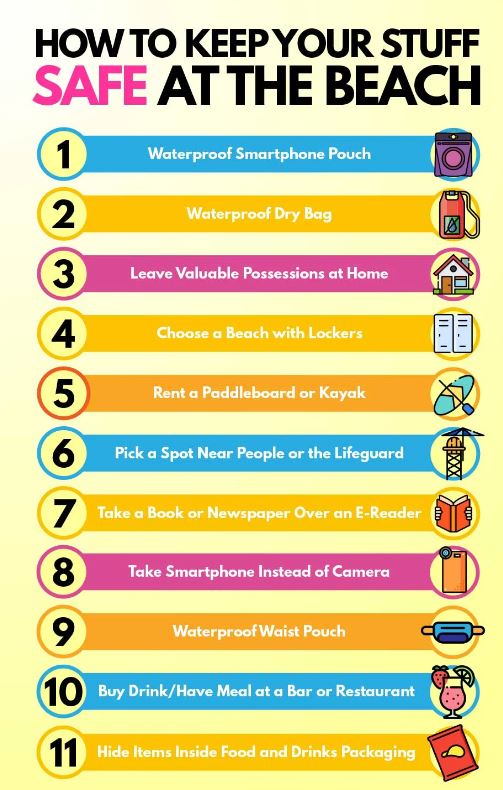If you’re planning to spend plenty of time in the water on holiday and want to know how to keep your valuables safe at the beach, then you’ve come to the right place.
These eleven simple and effective tips and techniques can help you sunbathe, swim, and have fun with peace of mind.
Thanks to a little smart thinking, these days I can go to the beach without worrying about my phone, wallet, and other valuables. You should be able to too!
12 Ways to Keep Your Valuables Safe at the Beach

Going to the beach is supposed to be relaxing and a great way to enjoy the sunshine and refreshing ocean water.
But as we all know, thieves and pickpockets are always on the lookout for unattended possessions. The beach is a place full of opportunities for them.
Worrying about your items being stolen is stressful. How can you relax sunbathing or taking a dip in the water when you have to think about your smartphone, cash, jewelry, wallet, and tech?
This is not a problem only solo travelers have to deal with, but groups as well. What if the whole group wants to swim together? How will you keep your valuables from becoming a target for potential thieves?
Thankfully, we have collated some of the cleverest ways to keep your items safe at the beach and not fall victim to thieves. Here’s how to keep your valuables safe at the beach, through eleven simple but effective methods.
- Invest in a Waterproof Smartphone Pouch
A waterproof dry bag with a lanyard is the perfect solution if you want to take your smartphone to the beach to go swimming.
You can even find a waterproof dry bag for phones with a touch sensitivity that will allow you to use your phone in the water.
A waterproof pouch or waterproof bag can also be used to store some cash, keys, credit cards, or small jewelry. Just make sure you wrap it tightly around your wrist or fasten the lanyard securely around the neck while swimming.
- Invest in a Waterproof Dry Bag
A dry bag is ideal if you want to bring lots of possessions that won’t fit in a small waterproof smartphone pouch.
You can bring a dry bag into the water with you. Simply fill it with your valuables, secure it at the top, and your airtight bag is ready to accompany you while swimming.
The bag will float on the surface right next to you, giving you peace of mind that your valuables are safe. Be mindful, however, that dry bags are not suitable for diving.
- Leave Valuable Possessions at Home
Think about what you actually need to bring with you. Most of the time, you don’t need to pack expensive jewelry and tech you won’t use.
There’s no reason to have too many valuable items on you for a day of sunbathing or swimming. Take only the basic items, and leave the rest of them in your room.
For example, you don’t have to take your wallet or purse with your passport and all of your credit cards. Instead, take some cash for the day, and keep it in a lockable bag or a zippered pocket. Leave your passport back and some of your cards in your room.
The same goes for tech. If you’re planning to relax and do a little swimming, do you really need to bring all your camera equipment with you? Pack light, and be realistic about what’s essential and what isn’t.
- Choose a Beach with Lockers
Some beaches have a locker service. For a small fee, you can store and hide valuables, and all you need to do is take care of the locker key, which will often come with a wrist strap.
Before you decide upon a beach, search online for beaches with lockers or beach-safe containers. If you can’t find any information on Google, Trip Advisor, or their personal website, look through reviews of the beach to see if they have such a service.
- Rent a Paddleboard or Kayak
If there are no lockers at the beach, a clever hack is to rent a paddleboard or a kayak. Companies that run these activities have systems for holding onto your valuables while you’re in the water.
Some rental services will allow you to keep your belongings in one of their lockers even after you’re allotted time is up. Don’t forget to ask before you rent one.
You don’t actually have to use the paddleboard or kayak, just make sure to return it when your time is up. If the hourly rental is a reasonable price, it could be worthwhile to keep your valuables safe while you’re in the water or sunbathing.
- Pick a Spot Near People or Sit Near the Lifeguard
If you’re going to the beach alone, don’t choose an isolated spot. It can make you an easy target for thieves.
Instead, pick a spot near larger gatherings of people, or even better, near the lifeguard tower. It’s their job to observe the environment at all times, which deters would be thieves.
- Take a Book or Newspaper Over an E-Reader
If you plan to read at the beach, buy a book or newspaper at the airport or a local newsagent.
E-readers and smartphones are easy targets for thieves. The glare from the sun can also make screens difficult to read when the sun is at its strongest.
Plenty of great bestsellers can be picked up for next to nothing. These books can be your holiday read, and you don’t have to be precious about sand, sunscreen stains, or damage, as you would with your tech.
Furthermore, books actually double up as an excellent hiding spot. You can easily hide slim smartphones, credit cards, and cash inside a book, without anyone knowing.
- Use your Smartphone for Taking Photographs, Over an Expensive Camera
Unless you intend to do some serious photography, most of today’s smartphones have the capacity to take excellent photos.
DSLR and larger cameras are easy targets due to their size. Their fragile lenses also make them susceptible to damage from sand or water.
If you are serious about photography, opt for a GoPro with a wrist or body strap. GoPros are very lightweight, so you can easily keep the camera attached to you. Their size also makes them ideal for stowing in waterproof pouches and other pockets.
Above all, be honest with yourself. Often we take expensive camera equipment with the right intentions but never end up using it.
- Wear a Waterproof Waist Pouch
Waterproof pouches are a great way to stow away items while you go for a swim on your beach trip. Plenty are on the market, but be sure to read up on the details of their waterproof capabilities.
Often companies will claim their products are waterproof, but are, in fact, only water-resistant, or can only be submerged for a short period of time. Be sure to read the product details.
- Buy a Drink or Have a Meal at a Bar or Restaurant
Once you’re finished, ask them if they’ll look after your belongings for you. As they’ll have a place to store it, and the staff is stationary, your items are far less likely to be stolen by thieves and you be a victim of beach theft. - Hide Your Items Inside Food and Drinks Packaging
As long as the packaging is cleaned and washed beforehand, empty food and drink packaging can be a creative way to hide your valuables.
Money can be easily rolled up and hidden in crisp packets, sunscreen bottles, drinks cans, or bottles. Smartphones, also, can easily be slotted into crisp packets or Pringles cans.
Hollow and wash the packaging thoroughly, and you have a creative, inexpensive way to keep your valuables hidden in places thieves would rarely think to look.
- Hide Your Valuables in the Sand Under a Beach Towel
If you have some small valuables, try putting them in a lockable beach bag or anti-theft beach bag, then burying this under a few layers of sand, before finally laying your beach towel over the top of it.
Now, you can enjoy plenty of swimming and beach time, with thieves none the wiser of your belongings that are cleverly hidden under a laid-out beach towel beneath the sand. Because of the beach towel, you will always know where you buried your stuff.
How to Keep Your Valuables Safe at the Beach Summary
Spending the day at the beach doesn’t have to be a stressful experience. Naturally, you should always be on alert and keep your wits about you.
But using one or more of the methods described in this article should go a long way to helping you keep your valuables safe and out of the line of sight of thieves.
So, one final time, here’s how to keep your valuables safe at the beach, with these eleven simple but effective methods.




